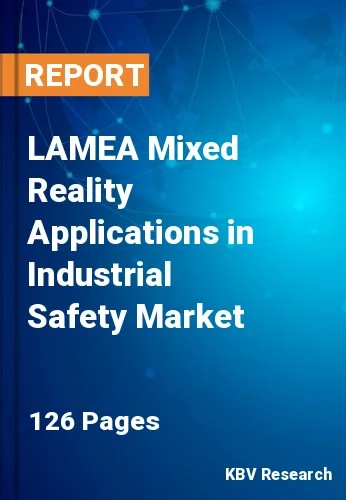Chapter 1. Market Scope & Methodology
1.1 Market Definition
1.2 Objectives
1.3 Market Scope
1.4 Segmentation
1.4.1 LAMEA Mixed Reality Applications in Industrial Safety Market, by Component
1.4.2 LAMEA Mixed Reality Applications in Industrial Safety Market, by Application
1.4.3 LAMEA Mixed Reality Applications in Industrial Safety Market, by Device Type
1.4.4 LAMEA Mixed Reality Applications in Industrial Safety Market, by Country
1.5 Methodology for the research
Chapter 2. Market at a Glance
2.1 Key Highlights
Chapter 3. Market Overview
3.1 Introduction
3.1.1 Overview
3.1.1.1 Market Composition and Scenario
3.2 Key Factors Impacting the Market
3.2.1 Market Drivers
3.2.2 Market Restraints
3.2.3 Market Opportunities
3.2.4 Market Challenges
Chapter 4. Competition Analysis – Global
4.1 Market Share Analysis, 2023
4.2 Porter Five Forces Analysis
Chapter 5. LAMEA Mixed Reality Applications in Industrial Safety Market by Component
5.1 LAMEA Hardware Market by Country
5.2 LAMEA Software Market by Country
Chapter 6. LAMEA Mixed Reality Applications in Industrial Safety Market by Application
6.1 LAMEA Aerospace & Defense Market by Country
6.2 LAMEA Entertainment & Gaming Market by Country
6.3 LAMEA Architecture Market by Country
6.4 LAMEA Medical Market by Country
6.5 LAMEA Other Applications Market by Country
Chapter 7. LAMEA Mixed Reality Applications in Industrial Safety Market by Device Type
7.1 LAMEA Wireless Market by Country
7.2 LAMEA Wired Market by Country
Chapter 8. LAMEA Mixed Reality Applications in Industrial Safety Market by Country
8.1 Brazil Mixed Reality Applications in Industrial Safety Market
8.1.1 Brazil Mixed Reality Applications in Industrial Safety Market by Component
8.1.2 Brazil Mixed Reality Applications in Industrial Safety Market by Application
8.1.3 Brazil Mixed Reality Applications in Industrial Safety Market by Device Type
8.2 Argentina Mixed Reality Applications in Industrial Safety Market
8.2.1 Argentina Mixed Reality Applications in Industrial Safety Market by Component
8.2.2 Argentina Mixed Reality Applications in Industrial Safety Market by Application
8.2.3 Argentina Mixed Reality Applications in Industrial Safety Market by Device Type
8.3 UAE Mixed Reality Applications in Industrial Safety Market
8.3.1 UAE Mixed Reality Applications in Industrial Safety Market by Component
8.3.2 UAE Mixed Reality Applications in Industrial Safety Market by Application
8.3.3 UAE Mixed Reality Applications in Industrial Safety Market by Device Type
8.4 Saudi Arabia Mixed Reality Applications in Industrial Safety Market
8.4.1 Saudi Arabia Mixed Reality Applications in Industrial Safety Market by Component
8.4.2 Saudi Arabia Mixed Reality Applications in Industrial Safety Market by Application
8.4.3 Saudi Arabia Mixed Reality Applications in Industrial Safety Market by Device Type
8.5 South Africa Mixed Reality Applications in Industrial Safety Market
8.5.1 South Africa Mixed Reality Applications in Industrial Safety Market by Component
8.5.2 South Africa Mixed Reality Applications in Industrial Safety Market by Application
8.5.3 South Africa Mixed Reality Applications in Industrial Safety Market by Device Type
8.6 Nigeria Mixed Reality Applications in Industrial Safety Market
8.6.1 Nigeria Mixed Reality Applications in Industrial Safety Market by Component
8.6.2 Nigeria Mixed Reality Applications in Industrial Safety Market by Application
8.6.3 Nigeria Mixed Reality Applications in Industrial Safety Market by Device Type
8.7 Rest of LAMEA Mixed Reality Applications in Industrial Safety Market
8.7.1 Rest of LAMEA Mixed Reality Applications in Industrial Safety Market by Component
8.7.2 Rest of LAMEA Mixed Reality Applications in Industrial Safety Market by Application
8.7.3 Rest of LAMEA Mixed Reality Applications in Industrial Safety Market by Device Type
Chapter 9. Company Profiles
9.1 Microsoft Corporation
9.1.1 Company Overview
9.1.2 Financial Analysis
9.1.3 Segmental and Regional Analysis
9.1.4 Research & Development Expenses
9.1.5 Recent strategies and developments:
9.1.5.1 Product Launches and Product Expansions:
9.1.6 SWOT Analysis
9.2 Google LLC (Alphabet Inc.)
9.2.1 Company Overview
9.2.2 Financial Analysis
9.2.3 Segmental and Regional Analysis
9.2.4 Research & Development Expense
9.2.5 Recent strategies and developments:
9.2.5.1 Partnerships, Collaborations, and Agreements:
9.2.6 SWOT Analysis
9.3 Canon, Inc.
9.3.1 Company Overview
9.3.2 Financial Analysis
9.3.3 Segmental and Regional Analysis
9.3.4 Research & Development Expenses
9.3.5 SWOT Analysis
9.4 Samsung Electronics Co., Ltd. (Samsung Health)
9.4.1 Company Overview
9.4.2 Financial Analysis
9.4.3 Segmental and Regional Analysis
9.4.4 Research & Development Expenses
9.4.5 SWOT Analysis
9.5 Meta Platforms, Inc.
9.5.1 Company Overview
9.5.2 Financial Analysis
9.5.3 Segment and Regional Analysis
9.5.4 Research & Development Expense
9.5.5 SWOT Analysis
9.6 HTC Corporation
9.6.1 Company Overview
9.6.2 Financial Analysis
9.6.3 Research & Development Expenses
9.6.4 SWOT Analysis
9.7 Dell Technologies, Inc.
9.7.1 Company Overview
9.7.2 Financial Analysis
9.7.3 Segmental and Regional Analysis
9.7.4 Research & Development Expense
9.7.5 SWOT Analysis
9.8 PTC, Inc.
9.8.1 Company Overview
9.8.2 Financial Analysis
9.8.3 Regional Analysis
9.8.4 Research & Development Expenses
9.8.5 SWOT Analysis
9.9 Hewlett Packard Enterprise Company
9.9.1 Company Overview
9.9.2 Financial Analysis
9.9.3 Segmental and Regional Analysis
9.9.4 Research & Development Expense
9.9.5 SWOT Analysis
9.10. Niantic, Inc.
9.10.1 Company Overview

